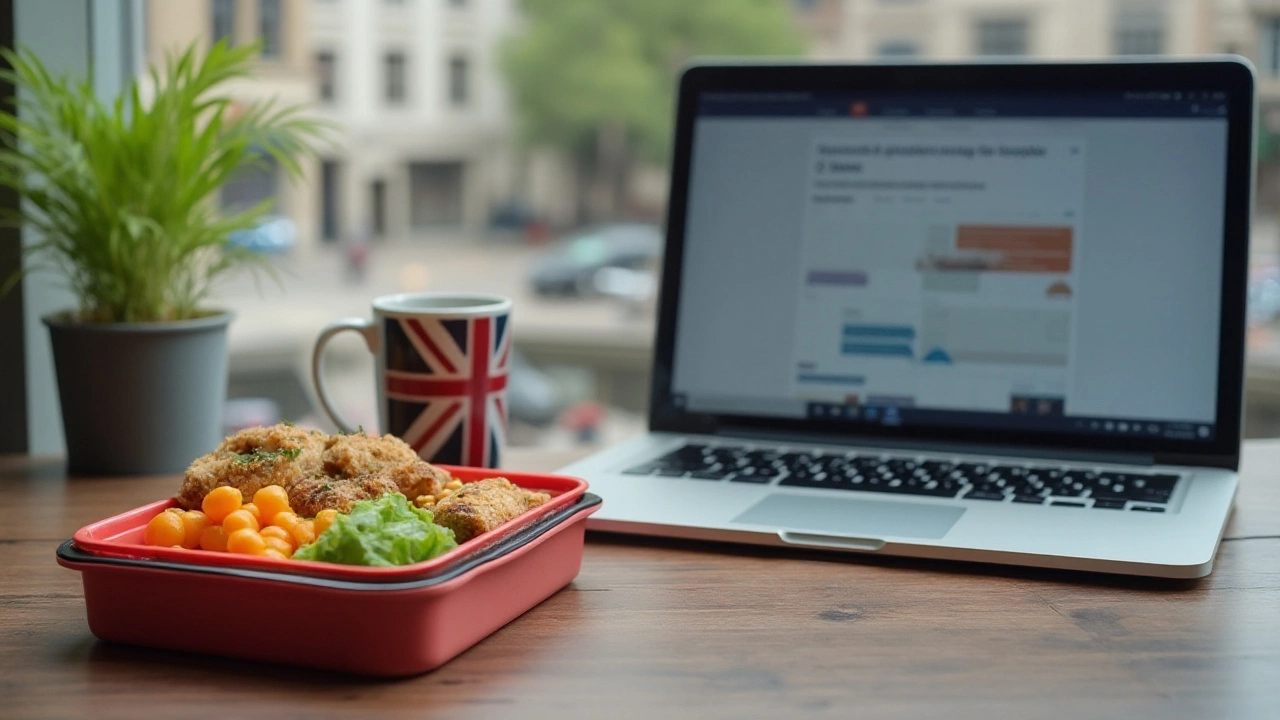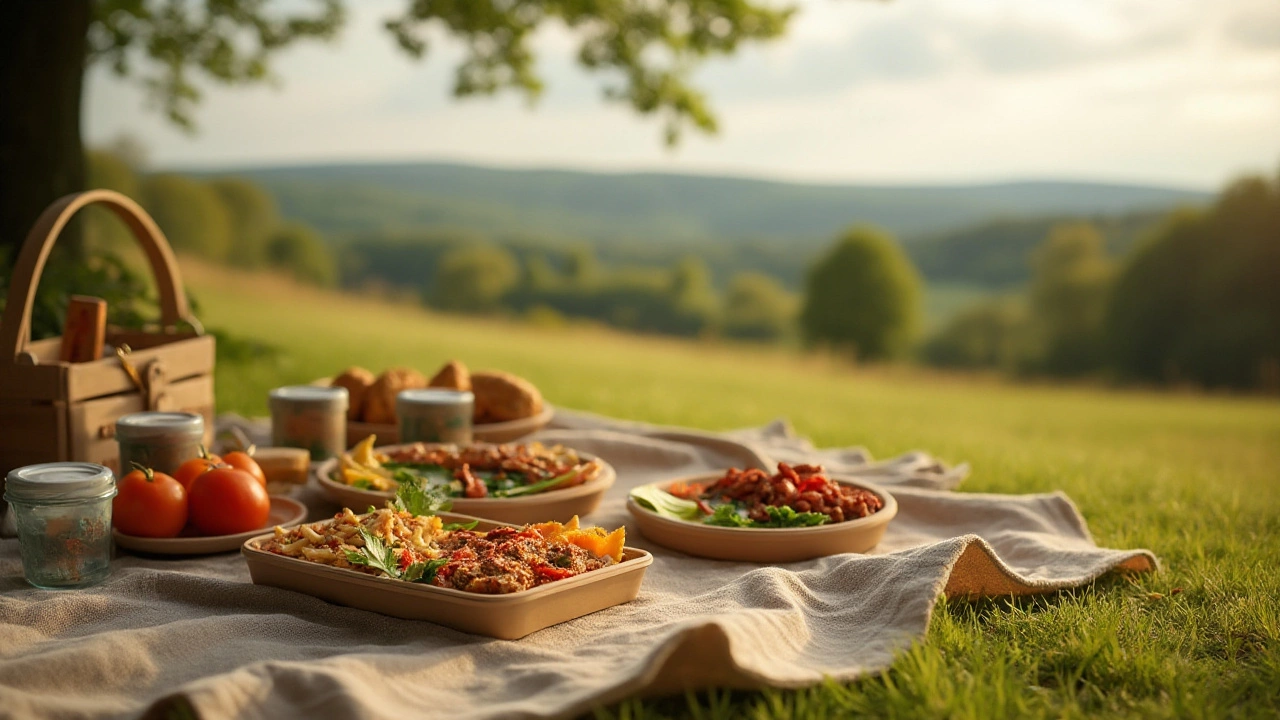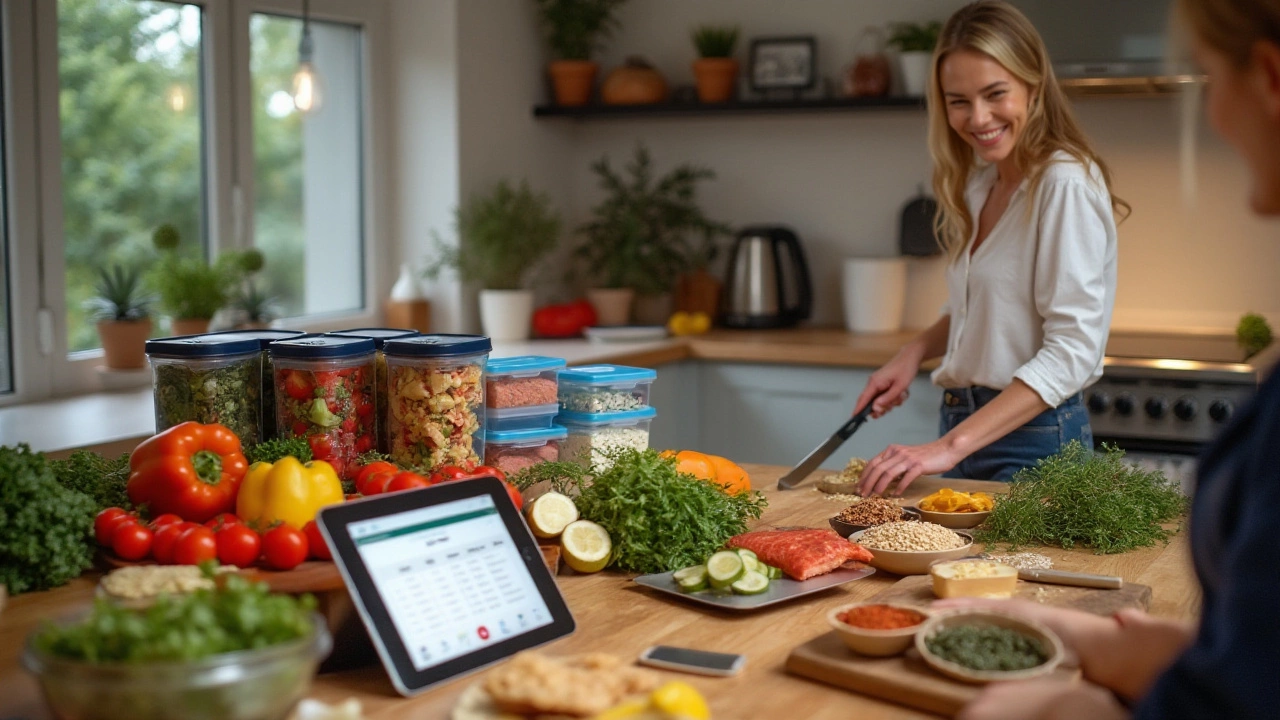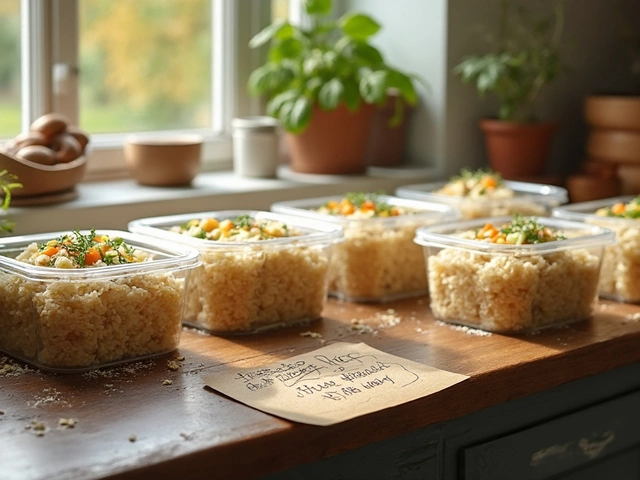Meal prepping has become a buzzword in the realm of healthy eating and efficient living. But should you jump on the bandwagon of prepping meals every single day, or is there a better way to approach it? In the fast-paced world we live in, striking the right balance between eating well and saving time can often seem like a juggling act.
Some swear by the discipline of daily meal prep for its unparalleled organization, while others find it too demanding. It's all about crafting a system that works within the contours of your own lifestyle while maintaining a focus on nutrition. This article aims to unwrap the conversation about daily meal prep, offering insights and practical tips on how it can become an integral part of your daily routine without feeling like a chore.
- Understanding Meal Prep Benefits
- Potential Downsides of Daily Meal Prep
- Balancing Time and Nutrition
- Practical Meal Prep Tips
Understanding Meal Prep Benefits
In today's fast-paced world, where time often slips through our fingers, the art of meal prepping offers a lifeline for those seeking to maintain healthy eating habits without the constant stress of daily cooking. At its core, meal prep is about efficiency and foresight, enabling individuals to plan and prepare meals in advance, usually for the whole week. This approach can dramatically simplify daily routines, eliminating the headache of last-minute meal decisions. For those with a penchant for organization, the act of meal prep not only saves time but also reduces food waste, as everything is pre-planned and ingredients are used smartly.
One significant advantage of meal prep is the potential for healthier eating. When meals are prepared ahead of time, there is a greater control over portion sizes, ingredients, and nutritional content, as opposed to impulsive decisions that can lead to unhealthy choices. It allows for a deliberate focus on including a balanced mix of proteins, veggies, and good carbohydrates, making it easier to stick to dietary goals. Research has shown that individuals who engage in regular meal prep are more inclined to consume a consistent diet that aligns with their nutritional needs, leading to better health outcomes.
Another undeniable benefit involves financial savings. Cooking in bulk often means buying in bulk, and when shopping with a meal plan in mind, waste is minimized, thereby reducing the grocery bill. By preparing meals ahead, it's also possible to avoid the often-costly temptations of takeout or dining out, which tend to add up quickly over a week or month. In addition, having meals ready at hand reduces the incidences of buying unnecessary snacks when hunger strikes unexpectedly.
Social aspects may also come into play, as sharing meal prep activities can become a family or community event. Gathering with family members or friends for a batch cooking day can be an enjoyable experience, fostering connections while prepping meals. As the famous food writer Michael Pollan once noted, "Cooking is more than preparing food; it's a way of connecting with others and with ourselves."
Michael Pollan reminds us, "Cooking isn't just about the food — it's also a way to connect with ourselves and others."By assembling meals at home, family members can actively participate in creating nutritious meals, thus promoting better eating habits for all involved.
Moreover, there's an undeniable sense of accomplishment that accompanies a well-stocked fridge lined with neatly packed meals. This organization often translates into other areas of life, bringing a mental clarity that many find beneficial. In addition, meal prep helps reinforce self-discipline, as it involves a commitment to stick to a planned routine and diet, which can carry over into other aspects of lifestyle management.
For those intrigued by the convenience and benefits of daily meal prepping, starting small is key. A strategic approach, starting with prepping lunches or dinners for a few days, can ease the transition. Over time, as confidence grows, meal prep can encompass more complex meal planning or bulk cooking for entire weeks, making the most out of every delicious bite. The blend of planning, creativity, and nutrition adds up to a powerful tool in the quest for healthier, stress-free living.

Potential Downsides of Daily Meal Prep
While the allure of daily meal prepping for those hoping to boost their healthy eating habits is undeniable, the practice isn’t without its challenges. One of the primary concerns is the amount of time required. Each day, carving out a portion of your schedule to meticulously plan, cook, and pack meals can become a demanding routine. Away from just the time at the stove, meal-prepping includes planning meals, navigating grocery stores, and washing up, all contributing to a significant time investment. It's not just about cooking but managing the components of your culinary life in a precise manner, which might not seem viable for everyone long-term.
Consistency is key in any habit-forming endeavor, yet daily meal prepping requires relentless dedication. Many find the need to pre-think every meal a tad overwhelming, often leading to decision fatigue. By choosing what to eat every day, individuals can quickly lose interest or motivation, ultimately resulting in reverting to more convenient but less healthy food choices. Moreover, the lack of spontaneity can also be stifling. Cooking daily can drain the enthusiasm for culinary creativity, as the rigid schedule often limits food experimentation.
When focusing on meal prep, dietary diversity often takes a backseat. Frequently, the emphasis on simplicity or selecting meals that are quick to prepare can lead to a repetitive menu. This repetitiveness could mean missing out on the variety of nutrients that different foods offer. There's a risk of falling into a nutritional rut when meals start looking and tasting the same day in and day out, potentially leading to nutrient deficiencies over time. As the Australian Dietary Guidelines recommend embracing a wide variety of food groups, an overly repetitive meal prep style could contradict this essential advice.
"A diverse diet ensures you receive the full spectrum of nutrients your body needs for optimum health," says nutritionist Dr. Stephanie Maggs. "Variety is not just the spice of life; it's foundational to well-rounded health."
Another downside to consider is food spoilage. With the goal of preparing fresh meals each day, the risk of ingredients going bad before use can be higher. Perishable foods that are not properly stored may easily spoil, adding waste and financial loss. In addition to spoilage, storing meal prep ingredients can pose a challenge for those with limited kitchen space. Managing the storage of fresh produce, dairy, or meats requires both physical space and a strategic approach to ordering refrigerator contents to maintain freshness.
The financial aspect of daily meal prep is also worth noting. The misconception exists that home-prepared meals are always the cheaper option, but when pushing for boundaries on freshness and quality, costs can escalate. Purchasing diverse and fresh ingredients every day to maintain an interesting and nutritious diet may strain budgets. It’s essential to assess the rise in grocery bills that can occur with daily prepping, especially if prioritizing organic or specialty items. However, learning to integrate habits/platforms like bulk buying and seasonal produce can mitigate some costs but require initial adjustments.
Understanding these potential downsides gives a more rounded picture of daily meal prepping. It calls into question how sustainable and flexible the approach truly is for individual circumstances varying vastly between households. Thus, while integrating meal prep into one’s life is commendable, assessing whether a daily routine matches personal and lifestyle needs is just as crucial.

Balancing Time and Nutrition
In today's rapid-fire lifestyle, achieving a perfect balance between time management and nutrition can feel like a circus act. Many people yearn to eat well but find the sheer act of preparing healthy meals each day overwhelming. The trick is not necessarily to meal prep every single day but rather to find a rhythm that aligns with your routine and eating habits. Let’s dissect how you can strike such a balance, making sure that your meal prep journey aids rather than hinders your quest for a healthier lifestyle.
To effectively manage your time while ensuring nutritious meals, it is important to recognize that the art of meal prep doesn't have to be an all-or-nothing endeavor. Start by planning your meals for the week. List down recipes that contain a balanced mix of proteins, carbohydrates, and vegetables. You might find it helpful to dedicate one day a week—perhaps a Sunday—as your meal prep day. This not only saves you time during the weekdays but also reduces stress and decision fatigue concerning what to eat. When fully optimized, meal prepping could save you up to 3 to 5 hours a week and helps in cutting food costs significantly.
Nutrition is equally vital in this time-nutrition formula. It is not only about the quantity but the quality of food you prepare. Incorporate a wide variety of colorful vegetables, lean meats, whole grains, and legumes into your meal prep to ensure a nutrient-rich diet. Consider foods that are not only convenient to prepare but also offer a good mix of macronutrients and micronutrients to nourish your body. Adopting a diverse range of recipes minimizes boredom and detour from healthy meals. Healthy eating does not need to be tedious when it is flavorful with a sprinkle of creativity.
Some experts advocate for the practice of batch cooking, where you cook large quantities of your chosen dishes and freeze portions for future use. This strategy can be a lifesaver on those evenings when time is short, and you might otherwise be tempted to opt for less healthy convenience food. This is supported by a quote from the renowned nutritionist Dr. Walter Willett who says, "Healthy meal preparation not only saves time but also contributes to more mindful and health-promoting dietary patterns." Such routines encourage dining at home more frequently, which is invariably more nutritious.
The balance between time and nutrition doesn't require a complete overhaul of your life. It’s about making gradual changes—getting comfortable with new routines or trying out new recipes until they become second nature. Keep an eye on portion sizes too. Using standardized containers ensures you’re not only saving time by pre-preparing meals but also regulating your caloric intake more effectively. By doing this, you nurture a habit that not only saves you time but also aids in achieving your dietary goals.

Practical Meal Prep Tips
Embarking on a meal prep journey doesn't have to be daunting. With a bit of planning and creativity, you can streamline your cooking process and ensure you're eating both healthily and efficiently. Start by selecting a few staple recipes that are not only nutritious but also easy to prepare in bulk. Think about dishes that can be creatively reimagined throughout the week—such as a roasted chicken that can be served with veggies, turned into a chicken salad, or added to a wrap. This way, you’re not eating the same meal every day, which can lead to burnout.
Keeping your kitchen organized is another crucial aspect. Invest in high-quality storage containers that are stackable and airtight to keep your meals fresh. Label them with the date and contents, so you know what's in each container at a glance. An uncluttered storage system helps ensure you’re not wasting time hunting for the right lid or container and not letting food go to waste. This is an important part of time management and organization in the kitchen. Speaking of time, consider setting aside a few hours on a calm day—perhaps a weekend afternoon—to chop, cook, and portion your meals. Having a dedicated meal prep day not only makes your weekdays easier but also encourages the habit of regular meal planning.
According to nutritionist Lisa Drayer, "Meal prepping isn't about restriction; it's about having a variety of nutritious options aligned with your tastes and dietary needs." This means you should tailor your meal prep to fit your individual health goals. Whether reducing calories or increasing protein intake, adjust your ingredients accordingly. Having a colorful selection of fruits and vegetables at your disposal can make a big difference in your mental and physical health. Different colors often represent different nutrients, so a diverse palette not only looks appealing but is also more nutritious.
Another vital tip is to budget your meal prep wisely. Purchase in bulk when possible, as this can save money and decrease reliance on last-minute takeout. Opt for seasonal produce—these fruits and vegetables are often more affordable and tastier when they're in season. Here’s a bonus: local farmer’s markets can be a treasure trove of fresh finds. Planning your meals around these goods not only supports small businesses but also brings flavor and variety to your plate.
- Start with a manageable number of meals.
- Incorporate new recipes gradually.
- Use online calendars or apps to track meal prep tasks.
- Join a community or forum for shared tips and motivation.
Finally, be adaptable. Things do not always go as planned, and that's perfectly okay. If a certain dish doesn’t work for you, tweak it until it does. Meal prep is a dynamic process that evolves with your needs, tastes, and lifestyle changes. By approaching it with flexibility and a sense of adventure, you can make it a rewarding aspect of your routine. With these cooking tips, daily meal prep can transform from a chore into a delightful commitment to healthy living.





